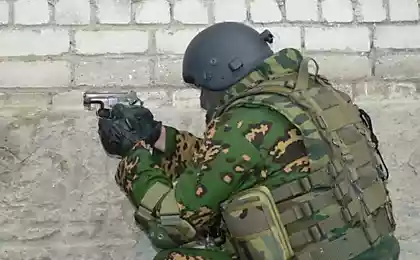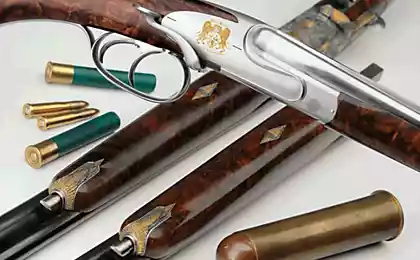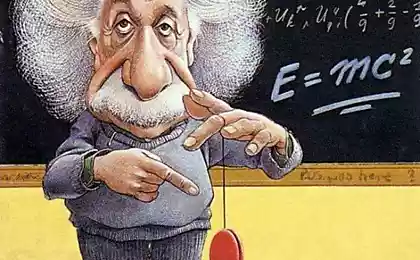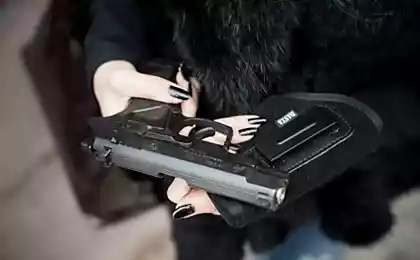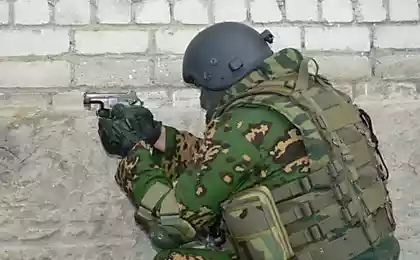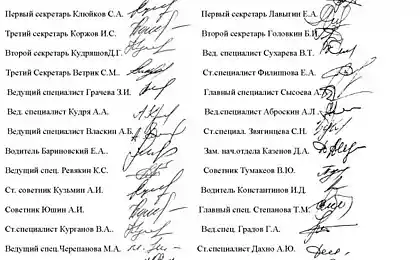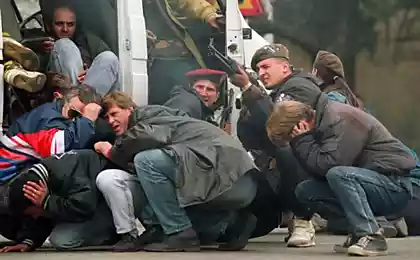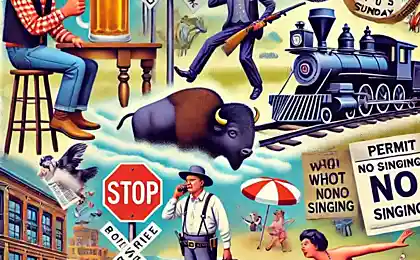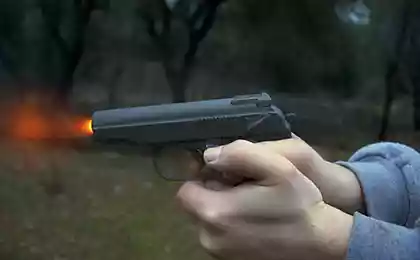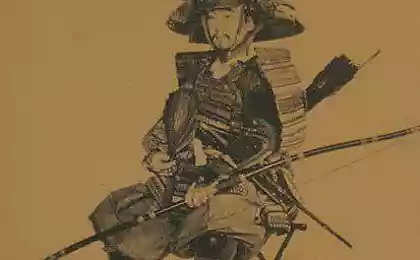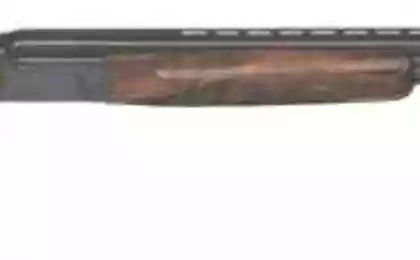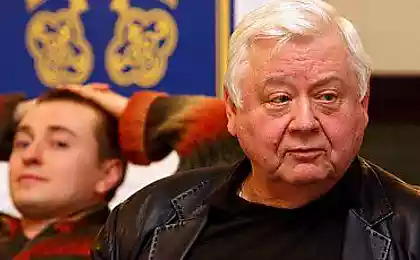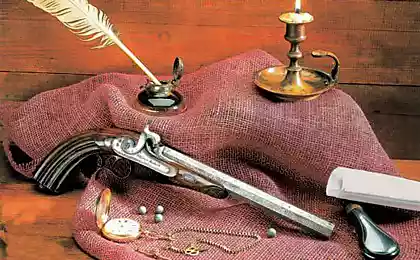897
Weapons in Russia. Laws and lawlessness
Before the first Russian revolution of 1905 in Russia arms freely sold in hunting shops. And not only available to us now hunting rifles and carbines, and pistols and revolvers - Mauser revolver Browning, Colts, Smith & Wesson ... You could even buy a machine gun "Maxim" Tula production. Whatever it was, but permission for this was not required at all - just go and buy what you like.
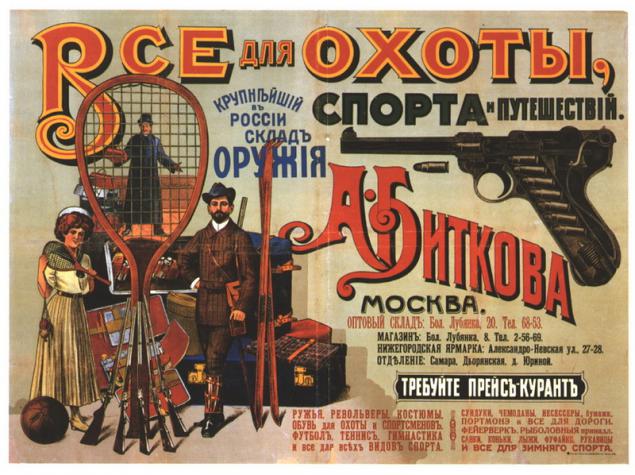
«...
- And Give me, my dear, it vooon ruzhishko. The other day we Pavel Andreyevich hares in his Meshchora chasing, so much so I had a drobovichek and then forgotten, so as not to go two hundred miles for such a simple thing ... Yes, there is. Tula, then? Good work, yes, we have learned that guns do ... Twelve rubles? And the two gold pieces, so the two? Well, then let two amiss. Now this hat with a feather. Yes, the right word, a good hat, and all for the ruble. Come on, try on ... Oh, well ... And this one pistol. Construction of Samuel Colt's talking about? What a fibber you the right word ... Eighteen rubles say? Expensive, of course, but very much it is beautiful, with a pearl handle cheeks ... Wrap. Yes, and ammunition, pieces of commercials, a hundred, add ... And what is the stick you in there? With a dagger, you say? And let's get it here! Ten rubles? Fear God, young man, her red price in three rubles! Ah built gun ... The curious thing ... Under the cartridge from the Velo-Dog ... It's a pity that the single shot ... Dutch work, you say? Oh, it was not, and tighten it. And be kind to deliver all Svinyin furnished rooms, that's my business card.
... »
In 1905, after the suppression of the revolution, the Russian government, concerned about the ease with which managed to arm the rebels, has introduced a number of restrictions on the free sale and purchase of arms, touching, but only threaded samples, as well as pistols and revolvers caliber of more than 6, 35mm. Now buy such weapons had a right to a man, who presented evidence for this name (similar to the modern license) issued by the local police chief. True to produce evidence of such a name is not required to collect any reference was - it was enough written request addressed to the head of the city police department and payment of stamp duty at fifty cents. For the successful solution of the case applicant had not had to be a criminal or a political criminal, and be trustworthy, according to police, a citizen. It prepares the nominal evidence from a couple of days in the capital, up to a month or more in a provincial town. Smooth-bore weapons and small-caliber pistols and revolvers continued to be bought and sold without any control was.
By the way, the new laws affect citizens previously acquired weapons - according to police regulations "previously acquired military-style weapons, in addition to award prizes and copies of" was withdrawn. However, in practice, law-abiding citizens is practically not affected, but among the so-called "suspicious" of the police during 1906 ... 1907 held regular searches and, in the whole country, seized more than 27 thousand "pistols, revolvers, fittings combatant and carbines of the sample. "

An exception to the new law is an officer of the army and navy, police and gendarmerie officials, border guards, as well as the government, had the right to acquire personal property for the service required, any firearms. They could even, in accordance with the law, had to use weapons for personal defense or the maintenance of public order and off-duty. Retirement, these categories of public servants retain the right to bear arms.
By the way, I did not discover America if I say that more important than the regulation of the sale and purchase of weapons, is the legal basis of its application. And while Russia had a very liberal attitude to self-defense. The result boring and confusing wording of the legal code, would give such words Anatoly Koni, while the Procurator Criminal Cassation Department Governing Senate (the supreme prosecutor's position), a member of the State Council of the Russian Empire "On the right of self-defense": "A person have a sense of self-preservation. It is inherent to it, and how there is a moral - wise, and as the supreme creation of the animal kingdom. This feeling is embedded in human nature so deep that it almost does not leave any time; man strives for self-preservation on the one hand, instinctively, and on the other - aware its right to exist. Due to the desire for self-preservation man tries to avoid the danger and take all measures to her disgust; - It has a right and, moreover, a right which should be regarded as innate. Conscious of its right to exist, the person protects this right from any infringement of another, not all of the rights ».
Over intelligibly and unambiguously. And practice of the period very clearly confirms his words.
However, savvy sellers quickly made an offer for those who, for one reason or another had no evidence - on sale there were guns, essentially consists of a sawn-off shotguns single and double-barreled shotgun hunting guns, as the most simple and stylized antique or combat pistols.
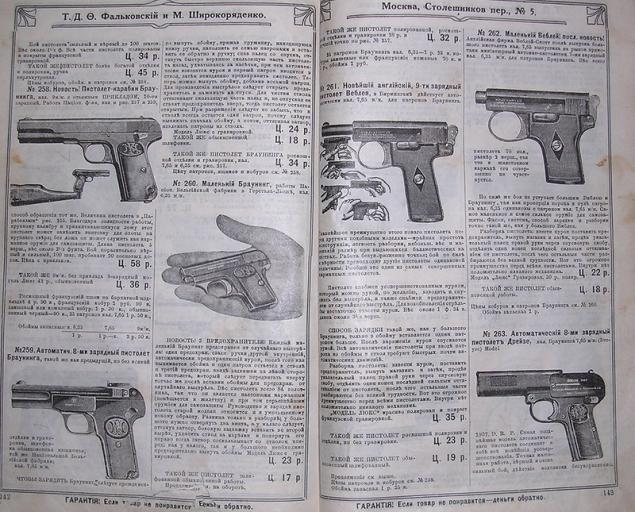
However, all these restrictions concern exclusively market the new weapon - the market of "second hand" was in the truest sense of the word market - Used weapons do not fall under the concept of "drill samples" completely freely can be purchased in a junk shop in Lombardy and just on the market .
This situation persisted with weapons and with the beginning of the First World War. In spite of it, and all the weapons sold and bought without additional restrictions.
We will not consider the periods of revolution and civil war. They are very much specific and unrepresentative, and proceed directly to the 1926, when Russia was established, finally, a no, and the procedure. Having seized power, the Reds decided to limit the right to own arms, entering the appropriate prohibition in the Criminal Code. But it concerns only rifled long guns in caliber of 6 mm., As well as pistols and revolvers, which were completely prohibited for sale. Now, for the mere illegal possession of such specimens could seriously pay - the RSFSR Criminal Code in 1926 contains a sanction - six months of corrective labor or a fine of up to one thousand rubles with confiscation of weapons.
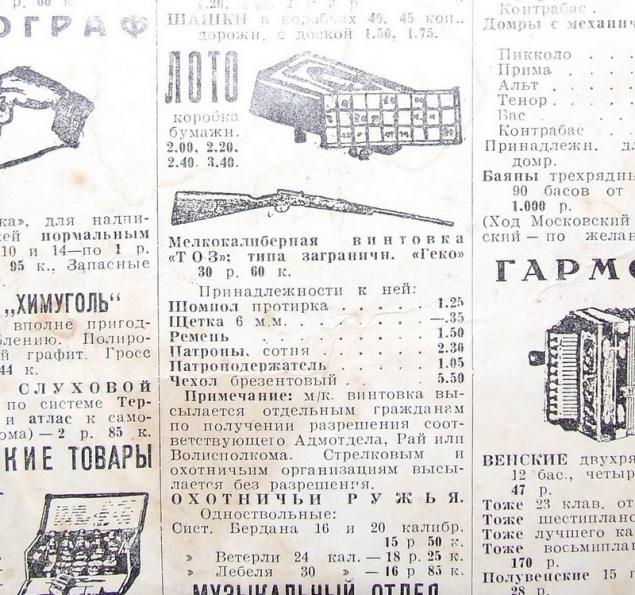
Shotguns and small caliber weapons were sold freely, but for his purchases require a certificate from the administration of the village, where he lived the buyer. Such certificates are issued, usually at the time of treatment and to obtain them it was enough to just more than a year to live in one place.
In 1935, the sanctions for illegal possession of weapons even tougher - offenders now face imprisonment for up to 5 years. In the same year some tougher restrictions on the sale of smoothbore and small caliber weapons - now to buy them were required to have a hunting license. However, it turns out he is actually a notification procedure (as, in general, then and now), and it could get any adult citizen, who had no previous convictions and disqualifications.
However, neither looking at such rigor, a very large number of both long-barreled drill samples rifles and pistols and revolvers, were legitimately in the hands of the population. They, however, can not be bought in the store, but they betrayed the state of his servant (rarely any official from the collective farm chairman and above, had to use a pistol or revolver) or work on it (hunting cooperatives, for example, or the caretaker, and the shepherds, examples are numerous, very often armed with quite a battle rifles and carbines and Mosin system Berdan). That is, the possession of weapons were transferred to another plane - now it required no personal desire, and the desire of the state and it is the state that determine the circle of those who could not protect themselves from crime. And all that is left to the ordinary man in the street Russian, sick of street crime - it longingly looking at the page of pre-revolutionary journals ...
During the Great Patriotic War will be omitted, as the post-war decade - formally continued to operate the norms of 1935, but in fact the situation with the weapon was uncontrollable and only the beginning of the 50s in this area managed to restore order, rid the country of a huge number of illegally held in her arms weapons. At the same time it was seized and the majority of the officials issued pistols and revolvers.
In 1954, while maintaining the standard of liability for illegal possession rifled dlinnostvola, pistols and revolvers, the order was legal indulgence turnover of smoothbore and small caliber weapons among the population. Since citizens were granted the right to freely acquire trading organizations and small-caliber smoothbore hunting weapons without "problems" with the hunting license, and it became possible to acquire the cut hunting weapon, but only in the presence of a hunting license.
«...
- Serve on, comrade, I won the drobovichek. Holland & Holland, you say? Dutch what? Ah, the English ... But eight hundred rubles for it, it is still expensive. Look at it and antabok no, no belt hook. Well, what of that "pre-war", what "British Steel"? However, my father, I remember, told me how good English shotguns under the previous regime it was ... Oh, come on, mate, I'll take this, "the English Dutchman." However, what I am about myself in the first place I think? My comrades were sent to work on the anniversary of Ivan Ivanovich drobovichek buy. He, you know, for a long time with me on the hunt suggests, and weapons, and he has none at all, so we decided it, so to speak, syurprizets do. That money has collected three hundred rubles, but the trade union has singled out one hundred and fifty. What can you show me, but new? Oh, Tula? Something rustic ... a good fight, you say? And here let him. Although, wait a minute, and let the two. Then my son, the Komsomol, a week goes to the virgin lands in the steppes of Kazakhstan, will give him, perhaps the same "tulkus».
... »
Then a group of lawyers of the Supreme Soviet of the RSFSR was prepared the first draft law on weapons, alleged serious "weakening nuts" - "reliable citizens" (as in tsarist times, loyal to the regime) was supposed to resolve to acquire a firearm, including, and short-on the Rights of the individual property. It was supposed to sell to citizens decommissioned models of weapons (other than automatic), as well as a trophy and lend-lease (the capacity limits of the ammunition used was not planned). The law passed approval of almost all instances except one, the most important - Khrushchev spoke against and the end of the 50's "nuts" have come to the starting position.
That changed in the late 1960s. It was forbidden to fluency even hunting shotguns and hunting restored requirements tickets. Since then, no one in this country can freely buy weapons or to possess them. All appeared by the time the samples, under penalty of 5-year sentence, was necessary to register with the police, to collect a certain number of statutory certificates and securities. Since then tightened and the law of self-defense. Now, the use of weapons for self-defense was almost always accompanied by the wildest wording "excessive force" and threatens big troubles of its owner. Since then, pistols and revolvers turned into a privilege policemen, military and certain categories of special servants. And, yes, policymakers, of course, retained for itself this right. For the average citizen, even a hunting rifle meant humiliating "Hunting for certificates". Has launched a campaign to deliver "ohotominimuma" which, gathering a bunch of different other restrictions resulted in a police permit system, no problems survived the collapse of the Soviet Union and preserved in the same form and now ...
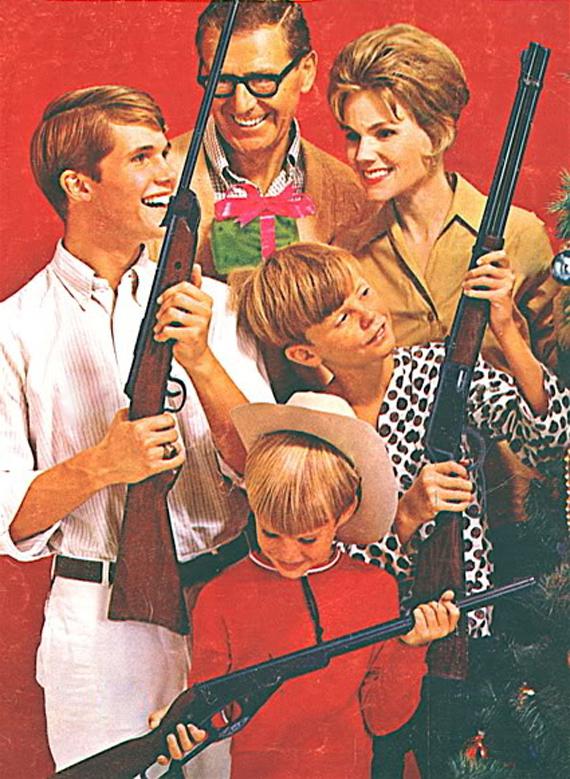

«...
- And Give me, my dear, it vooon ruzhishko. The other day we Pavel Andreyevich hares in his Meshchora chasing, so much so I had a drobovichek and then forgotten, so as not to go two hundred miles for such a simple thing ... Yes, there is. Tula, then? Good work, yes, we have learned that guns do ... Twelve rubles? And the two gold pieces, so the two? Well, then let two amiss. Now this hat with a feather. Yes, the right word, a good hat, and all for the ruble. Come on, try on ... Oh, well ... And this one pistol. Construction of Samuel Colt's talking about? What a fibber you the right word ... Eighteen rubles say? Expensive, of course, but very much it is beautiful, with a pearl handle cheeks ... Wrap. Yes, and ammunition, pieces of commercials, a hundred, add ... And what is the stick you in there? With a dagger, you say? And let's get it here! Ten rubles? Fear God, young man, her red price in three rubles! Ah built gun ... The curious thing ... Under the cartridge from the Velo-Dog ... It's a pity that the single shot ... Dutch work, you say? Oh, it was not, and tighten it. And be kind to deliver all Svinyin furnished rooms, that's my business card.
... »
In 1905, after the suppression of the revolution, the Russian government, concerned about the ease with which managed to arm the rebels, has introduced a number of restrictions on the free sale and purchase of arms, touching, but only threaded samples, as well as pistols and revolvers caliber of more than 6, 35mm. Now buy such weapons had a right to a man, who presented evidence for this name (similar to the modern license) issued by the local police chief. True to produce evidence of such a name is not required to collect any reference was - it was enough written request addressed to the head of the city police department and payment of stamp duty at fifty cents. For the successful solution of the case applicant had not had to be a criminal or a political criminal, and be trustworthy, according to police, a citizen. It prepares the nominal evidence from a couple of days in the capital, up to a month or more in a provincial town. Smooth-bore weapons and small-caliber pistols and revolvers continued to be bought and sold without any control was.
By the way, the new laws affect citizens previously acquired weapons - according to police regulations "previously acquired military-style weapons, in addition to award prizes and copies of" was withdrawn. However, in practice, law-abiding citizens is practically not affected, but among the so-called "suspicious" of the police during 1906 ... 1907 held regular searches and, in the whole country, seized more than 27 thousand "pistols, revolvers, fittings combatant and carbines of the sample. "

An exception to the new law is an officer of the army and navy, police and gendarmerie officials, border guards, as well as the government, had the right to acquire personal property for the service required, any firearms. They could even, in accordance with the law, had to use weapons for personal defense or the maintenance of public order and off-duty. Retirement, these categories of public servants retain the right to bear arms.
By the way, I did not discover America if I say that more important than the regulation of the sale and purchase of weapons, is the legal basis of its application. And while Russia had a very liberal attitude to self-defense. The result boring and confusing wording of the legal code, would give such words Anatoly Koni, while the Procurator Criminal Cassation Department Governing Senate (the supreme prosecutor's position), a member of the State Council of the Russian Empire "On the right of self-defense": "A person have a sense of self-preservation. It is inherent to it, and how there is a moral - wise, and as the supreme creation of the animal kingdom. This feeling is embedded in human nature so deep that it almost does not leave any time; man strives for self-preservation on the one hand, instinctively, and on the other - aware its right to exist. Due to the desire for self-preservation man tries to avoid the danger and take all measures to her disgust; - It has a right and, moreover, a right which should be regarded as innate. Conscious of its right to exist, the person protects this right from any infringement of another, not all of the rights ».
Over intelligibly and unambiguously. And practice of the period very clearly confirms his words.
However, savvy sellers quickly made an offer for those who, for one reason or another had no evidence - on sale there were guns, essentially consists of a sawn-off shotguns single and double-barreled shotgun hunting guns, as the most simple and stylized antique or combat pistols.

However, all these restrictions concern exclusively market the new weapon - the market of "second hand" was in the truest sense of the word market - Used weapons do not fall under the concept of "drill samples" completely freely can be purchased in a junk shop in Lombardy and just on the market .
This situation persisted with weapons and with the beginning of the First World War. In spite of it, and all the weapons sold and bought without additional restrictions.
We will not consider the periods of revolution and civil war. They are very much specific and unrepresentative, and proceed directly to the 1926, when Russia was established, finally, a no, and the procedure. Having seized power, the Reds decided to limit the right to own arms, entering the appropriate prohibition in the Criminal Code. But it concerns only rifled long guns in caliber of 6 mm., As well as pistols and revolvers, which were completely prohibited for sale. Now, for the mere illegal possession of such specimens could seriously pay - the RSFSR Criminal Code in 1926 contains a sanction - six months of corrective labor or a fine of up to one thousand rubles with confiscation of weapons.

Shotguns and small caliber weapons were sold freely, but for his purchases require a certificate from the administration of the village, where he lived the buyer. Such certificates are issued, usually at the time of treatment and to obtain them it was enough to just more than a year to live in one place.
In 1935, the sanctions for illegal possession of weapons even tougher - offenders now face imprisonment for up to 5 years. In the same year some tougher restrictions on the sale of smoothbore and small caliber weapons - now to buy them were required to have a hunting license. However, it turns out he is actually a notification procedure (as, in general, then and now), and it could get any adult citizen, who had no previous convictions and disqualifications.
However, neither looking at such rigor, a very large number of both long-barreled drill samples rifles and pistols and revolvers, were legitimately in the hands of the population. They, however, can not be bought in the store, but they betrayed the state of his servant (rarely any official from the collective farm chairman and above, had to use a pistol or revolver) or work on it (hunting cooperatives, for example, or the caretaker, and the shepherds, examples are numerous, very often armed with quite a battle rifles and carbines and Mosin system Berdan). That is, the possession of weapons were transferred to another plane - now it required no personal desire, and the desire of the state and it is the state that determine the circle of those who could not protect themselves from crime. And all that is left to the ordinary man in the street Russian, sick of street crime - it longingly looking at the page of pre-revolutionary journals ...
During the Great Patriotic War will be omitted, as the post-war decade - formally continued to operate the norms of 1935, but in fact the situation with the weapon was uncontrollable and only the beginning of the 50s in this area managed to restore order, rid the country of a huge number of illegally held in her arms weapons. At the same time it was seized and the majority of the officials issued pistols and revolvers.
In 1954, while maintaining the standard of liability for illegal possession rifled dlinnostvola, pistols and revolvers, the order was legal indulgence turnover of smoothbore and small caliber weapons among the population. Since citizens were granted the right to freely acquire trading organizations and small-caliber smoothbore hunting weapons without "problems" with the hunting license, and it became possible to acquire the cut hunting weapon, but only in the presence of a hunting license.
«...
- Serve on, comrade, I won the drobovichek. Holland & Holland, you say? Dutch what? Ah, the English ... But eight hundred rubles for it, it is still expensive. Look at it and antabok no, no belt hook. Well, what of that "pre-war", what "British Steel"? However, my father, I remember, told me how good English shotguns under the previous regime it was ... Oh, come on, mate, I'll take this, "the English Dutchman." However, what I am about myself in the first place I think? My comrades were sent to work on the anniversary of Ivan Ivanovich drobovichek buy. He, you know, for a long time with me on the hunt suggests, and weapons, and he has none at all, so we decided it, so to speak, syurprizets do. That money has collected three hundred rubles, but the trade union has singled out one hundred and fifty. What can you show me, but new? Oh, Tula? Something rustic ... a good fight, you say? And here let him. Although, wait a minute, and let the two. Then my son, the Komsomol, a week goes to the virgin lands in the steppes of Kazakhstan, will give him, perhaps the same "tulkus».
... »
Then a group of lawyers of the Supreme Soviet of the RSFSR was prepared the first draft law on weapons, alleged serious "weakening nuts" - "reliable citizens" (as in tsarist times, loyal to the regime) was supposed to resolve to acquire a firearm, including, and short-on the Rights of the individual property. It was supposed to sell to citizens decommissioned models of weapons (other than automatic), as well as a trophy and lend-lease (the capacity limits of the ammunition used was not planned). The law passed approval of almost all instances except one, the most important - Khrushchev spoke against and the end of the 50's "nuts" have come to the starting position.
That changed in the late 1960s. It was forbidden to fluency even hunting shotguns and hunting restored requirements tickets. Since then, no one in this country can freely buy weapons or to possess them. All appeared by the time the samples, under penalty of 5-year sentence, was necessary to register with the police, to collect a certain number of statutory certificates and securities. Since then tightened and the law of self-defense. Now, the use of weapons for self-defense was almost always accompanied by the wildest wording "excessive force" and threatens big troubles of its owner. Since then, pistols and revolvers turned into a privilege policemen, military and certain categories of special servants. And, yes, policymakers, of course, retained for itself this right. For the average citizen, even a hunting rifle meant humiliating "Hunting for certificates". Has launched a campaign to deliver "ohotominimuma" which, gathering a bunch of different other restrictions resulted in a police permit system, no problems survived the collapse of the Soviet Union and preserved in the same form and now ...


